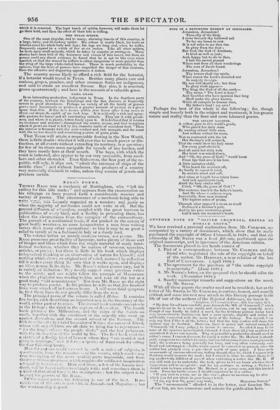RAGG'S POEMS.
THOMAS RAGG was a mechanic of Nottingham, who "left his calling for this idle trade ;" and appears from the enumeration on his titlepage to have poured forth a considerable number and variety of poems. The circumstance of a mechanic being able to 'WA; formerly regarded as a wonder; and justly so when the majority of mechanics could not write at all. But the general diffusion of education, coupled with the great increase in publications of every kind, and a facility in procuring them, has taken the circumstance from the category of the extraordinary. The pursuit of a mechanical trade, if not pushed to the extent of great bodily weariness, no more incapacitates a man from writing verses than many other occupations: to him it may be as great a relief to versify as to a fashionable lady or a dandy lord. The volume before us merely contains verses, not poems. Mr. RAGG possesses great facility of language, Ruda plenty of those sort of images and ideas which form the staple material of ready intel- lectual workmen, whether they be makers of sermons, speeches, articles, or poems : but there is little in his book which displays independent tl,:oking or an observatbn of nature for himself; and nothing whiLl. s:lows an original cast of mind, matured by reflection till it makes every thing its own that it works upon, and displays. an idles; nerasy in its st3le. Mr. Rm.:ifs minor poems vary, but it is variety of imitation : they mostly suggest some previous writer to the mind: and one might follow the example oh' Mammanu when the plagiarist was reading to him, and take off the lint at a good many "old acquaintance." Nor does Mr. RAGo go the right way to produce poems. In his preface he tells us that flee lone/red lines were struck off in fourteen hours. A still more fatal s,yinptom is, that these lines du not greatly differ from the rest. The principal poem of the volume is called Heber. It contains five books, each describing an important ;era in the theocracy of the Vorld, either past or to collie. The second book narrates an episode in the Deluge ; the third in the capture of Jeru,;aletn. The fourth book pictures the Millennium, and the reign of the laints on earth, together with the ovr rthrew of the unnorily who went up againq Jort,,,alem, and the sccond advent of tile Saviour. The fifth 1' Or the la,t brief loosening of S:, tan ; the earee r of Ni tsol, whose wife and children are all slain to hring him to repentance- " for the hinr.i..1 off::nCe the people died ;" and the last judgment, with the destrut.tion of the world by fire. The tir,t book contains a sketch of a fleshly kiwi of lo on where they " are married and given lit marnage," and it for:. . Flu:cies of framework fia selli,sg. the four following books. If fot art. one could h in such a series of mthjects, is tp:: eoloahle, "from the remotei., of the events, which render any true m ription of the more worhily parts impossible, and from
their •erioos greatness, which ref Sires the sublime,t imagination
hy to hers: ;;Ild there, a few 'chute human inci- rler,ts -4:11 be FAuld rather touchingly told; and sometimes there is a kind of rhetorical force lo the descriptions : but the subject is far I.o./..ers of Mr. It y.(..
th.e poems. the 1,11,rwing orm of the be.,t. It re- 7:.: tic': artolo mot v ith in Annuals and Mavzinca ; but the worr.:.,,:.sh:p ii good.
SONO OF A RETURNING HEBREW AT JERUSALEM. Jerusalem, Jerusalem! Thou city of the blest, I come beneath thy hallowed soil To lay my bones to rest.
It is not mine to see thee rise
In glory from the dust ; But God, the God of Abraham, Is kind as well as just ;
And, happy but to die in thee,
limit the sacred ground 'Where rest from alt their wanderings The sons of Jacob found.
Jerusalem, Jerusalem!
Thy towers shall rise again, When comes the Lord's anointed one In majesty to reign. My sun will shortly set ; but thou
In glory shalt appear— Thy king, the God of all the earth—
Thy name, " The Lord is here." And Gentiles who have spurned thee long Shall make thy glory known, While all conspire to honour thee, My father's land ! my own!
Perhaps the best of the whole is the following; for, though simple and homely both in the subject and treatment, it has greater nature and reality than the finer and more laboured poems.
THE INFANT MONITOR.
A. widow, poor in this world's goods,
Who gaiii'd her daily store By nursing others' little ones. And seldom wished for inure, Was so contented with the lot Her Saviour's will (waited,
That she could bless his holy name For every good °heated.
And oft amid her daily toils Her heart was raised above,
And " 011, the grace of God!" would burst
From lips that own'd his love.
A little imitative child, Who heard the sentence oft,
As fondly to repeat it tried, In accents sweet and soft.
And when at length 'twas taken home And rich apartments trod, Amid the busy circles still
Cried, " Oh, the grace of God!"
The sentence touch'd the &titer's heart ; And lie whose wondrous ways, Inscrutable, from man demand The highest notes of praise,
Through what appear'd a mean so smal/
PeriOrwed a Saviour's part, Anti by his pure converting grace
Call'd back the wanderer's heart.


























 Previous page
Previous page